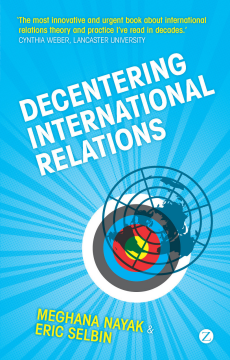
Additional Information
Book Details
Abstract
Decentering International Relations seeks to actively confront, resist, and rewrite International Relations (IR), a heavily politicized field that is deeply centered in the North/West and privileges certain perspectives, pedagogies, and practices. Is it possible to break the chain of signifiers that always leads IR studies back to the US and its European allies?
Through engagement with a variety of theories (ranging beyond the usual 'mainstream' versus 'critical/alternative' binary), and conversations with scholars, activists, and students, the authors invite the reader to participate in an accessible yet provocative experiment to decentre the North/West when we learn, study and do IR. In particular, they examine how the pressing issues of 'human rights', 'globalization', 'peace and security', and 'indigeneity' are simultaneously normative inventions meant to sustain particular power structures and sites for insurgent and subversive attempts to live IR at the margins.
Selbin and Nayak have written a remarkable and provocative re-envisioning of a globally important subject.
Meghana Nayak is Associate Professor of Political Science and teaches in the Women's and Gender Studies Department at Pace University-New York. She has published in International Feminist Journal of Politics, International Studies Review, Women and Politics. Her work focuses on social movements, the politics of gender violence, and feminist and critical approaches to hegemony, security, and identity.
Eric Selbin is Professor and University Scholar at Southwestern University. His books include Modern Latin American Revolutions (1998); Revolution, Rebellion, Resistance (Zed 2010). In 2007 he was selected as one of Southwestern University's all-time 'Fav Five' Faculty and received an Exemplary Teaching Award in 2001-2002.
'The most innovative and urgent book about international relations theory and practice I've read in decades.'
Cynthia Weber, Lancaster University
'Nayak and Selbin effectively engage all of us as students, as people trying to make more reliable, less blinkered sense of international politics. Their style is accessible, the questions they pose crucial. They challenge each of us to seriously think about who "we" are when we talk about "them." That's IR at its best.'
Cynthia Enloe, author of Nimo's War, Emma's War: Making Feminist Sense of the Iraq War
'This is a refreshingly unusual book on International Relations. It asks all the right questions, not only about world politics but about the ways they are seen and theorised.'
Stephen Chan, author of The End of Certainty
'This superb book audaciously undermines International Relations theory conceived in Western conceit. Without denying Western power, the book asks whether the peoples of the world wake each day forming privileged opinions about us, presuming to give us their prescriptions for what they think we should do.'
Richard Peet, Clark University and author of Unholy Trinity
'Nayak and Selbin's well-crafted new volume contributes to the small but growing literature that seeks to "decenter, unsettle, relativize and provincialize" the pseudo-universalisms of a profoundly (neo)colonial International Relations (IR) discipline fundamentally rooted in and reproductive of the self-understandings of the USA/North/West.'
Jutta Weldes, University of Bristol
'Nayak and Selbin engage in an important debate which for too long has taken place on the peripheries of our discipline.'
Jacqui Ala, University of the Witwatersrand
Table of Contents
| Section Title | Page | Action | Price |
|---|---|---|---|
| About the Authors | i | ||
| Acknowledgments | vi | ||
| Chapter One / Introduction | 1 | ||
| Us, Them, Over There | 1 | ||
| The Story of IR | 4 | ||
| Centering and Decentering: More than a Matter of Semantics | 8 | ||
| How and Why We Question IR | 10 | ||
| An Insurgent IR | 13 | ||
| Chapter Two / Indigeneity | 21 | ||
| Rethinking IR’s Tourism – Northern/Western Fantasies of Indigeneity | 21 | ||
| The Category of Indigeneity | 23 | ||
| Indigeneity as a Site for Decentering International Relations | 37 | ||
| Chapter Three / Human Rights | 51 | ||
| Introduction | 51 | ||
| The ‘Origins’ of Human Rights | 52 | ||
| Where is (Y)Our Moral Outrage? | 63 | ||
| Stories and Storytellers | 85 | ||
| Chapter Four / Globalization | 91 | ||
| Grappling with Globalization | 91 | ||
| Bodies and Borders | 93 | ||
| The Production of Knowledge | 101 | ||
| From International Political Economy to Local, Sustainable Communities of Possibility/ies | 108 | ||
| Chapter Five / Peace and Security | 124 | ||
| Introduction | 124 | ||
| Temporality | 126 | ||
| Safe States; Unsafe People | 133 | ||
| Pathways to Peace? | 139 | ||
| Chapter Six / Conclusion | 157 | ||
| Contentious Cartography: Shifting Sands and the Topography of IR Today | 157 | ||
| Notes | 167 | ||
| Chapter One | 167 | ||
| Chapter Two | 174 | ||
| Chapter Three | 177 | ||
| Chapter Four | 183 | ||
| Chapter Five | 186 | ||
| Chapter Six | 189 | ||
| References | 191 | ||
| Index | 207 |
